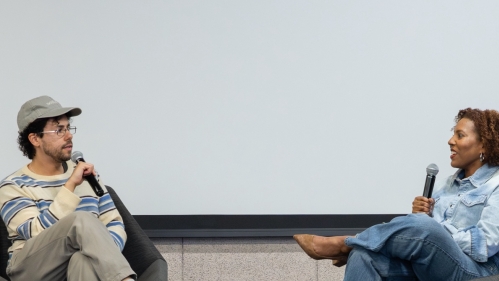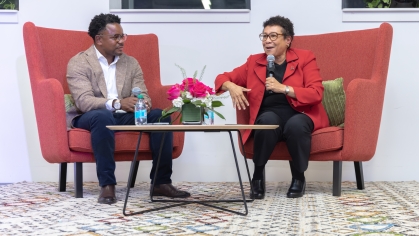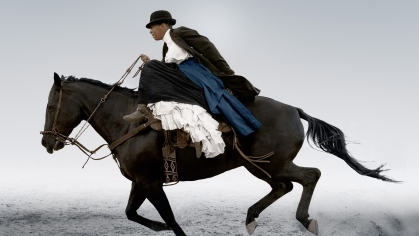At Express Newark, Ramy Youssef Discusses His New Animated Series About A Muslim Family in Jersey Post 9/11

Ramy Youssef, who gave Rutgers-Newark’s commencement address, also stopped by Express Newark arts center for a screening of his new animated series #1 Happy Family USA about a Muslim boy coming of age in the aftermath of 9/11.
In a conversation with Express Newark director Salamishah Tillet, Youssef, a former Rutgers-Newark student, reflected on the process of creating the show and what it reveals about his own life. Like Rumi, the show’s main character, Youssef grew up in suburban New Jersey, the son of Egyptian immigrants facing suspicion and stereotypes in the wake of 9/11.
But he said the show’s themes are also universal. It explores both the intense self consciousness of adolescence and the split between the self we present to the world and the person we are at home. For the characters, all of it is heightened by the scrutiny American Muslims faced after the 2001 terrorist attack.
“Middle schoolers already experience life with hyper surveillance,’’ said Youssef. “But then there is this global opinion on your life. You’re in this perpetual defensive state because of a massive misunderstanding–that’s the nicest way to put it. It’s that feeling that everyone has to be different inside the house or outside the house.’’
The Husseins, the happy family of the show’s title, struggle with the constant strain of “code-switching”’ between their own culture and the culture of mainstream America, he said. The characters, especially Rumi’s dad, struggle to prove that they’re assimilated and nonthreatening.
Youssef, who began his career as a stand up comic, has won acclaim for creating comedies that mine his own experiences and the stories of other immigrants. His Hulu show Ramy was the first series about a Muslim-American family. He played the title character, who is caught between the values of his Muslim community and the world of his millennial peers. He won a Gold Globe Award for his performance as an actor.
Youssef also co-created Mo, about a Palestinian immigrant in Houston, played by Mohammed Amer.
Youssef dislikes it when his shows are viewed as representative of all Muslim Americans, even if they’re praised for offering positive portrayals. It hinders viewers from seeing his characters as the complex individuals they are, he said.
“It’s like, ‘Hey Muslims! There’s a show coming for you!’ No one ever says, ‘white guys who are 20, here’s your show,’’’ he observed. “It’s this false kind of pat on the back. Like, we have a checklist and we did that, so now we can move on.’’
He added, “I refuse to see art get censused. It’s not meant to be statistical or logical. It’s barely meant to be informative. It’s only meant to be emotionally evocative and that’s it.’’
Each episode of his new show opens with a warning that it doesn't represent all Muslim-Americans or people from New Jersey. But Youssef, who grew up Rutherford, declared his love for the Garden State.
“It does feel like we’re in the shadow of a skyscraper from New York, ‘’ he said. “It’s why I love New Jersey so much. It’s an underdog thing. I love how industrial it can be and how community-based. It’s every political spectrum on one block. It wouldn’t want be from anywhere else.’’
He confessed, however, that he now lives in Brooklyn. “I have to point out my own hypocrisy,’’ he joked.
Youssef shared warm memories of his time at Rutgers-Newark more than a decade ago, when he majored in Political Science but left to pursue his career as a creator and performer. “The diversity of this campus is a reflection of New Jersey,’’ he said. “I took a lot from here. I met such great friends and I saw being Muslim here in a cool social way. It was attractive and people were really kind and open. It’s that whole thing of being with a bunch of adults who are like, ‘ let’s go pray, let’s go eat and then we gotta go to class.’’’
He also admired Express Newark, where he toured Ritual, a collection of exhibitions that explore the relationship between Islamic spiritual practices, rituals, and art. It includes Powers of the Unseen, which features photography works exploring the Muslim concept of the Unseen (al-Ghayb), which refers to that which is hidden from the visible world and beyond human perception.
Youssef compared it to bringing his own work from concept to reality. “Everyone comes together to make the unseen seen. It never looks like you thought it would. It always defies what you thought it could be,’’ he said. “There is that unseen thing that stirs you to make something or connect with someone. That’s everything. It all kind of lives there.’’


